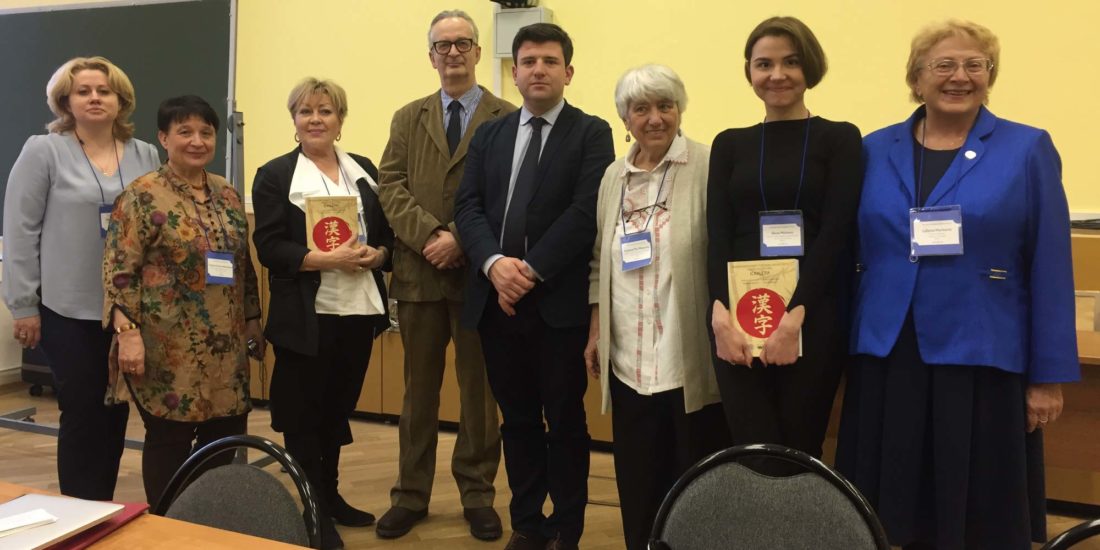The first IAFOR Silk Road Initiative roundtable of 2018 was held in Moscow on February 21, and in partnership with Moscow State University.
The event was hosted by the Moscow State University Institute of Asian and African Studies, and opened by the Director of the Institute, renowned scholar of politics and international relations, Professor Igor I. Abylgaziev. Attended by a group of invited scholars from both universities in Moscow and abroad, the Roundtable was organised with the kind support of the President of the Faculty of Foreign Languages and Area Studies, Professor Svetlana Ter Minasova, and Dr Elena Mishieva, Academic Secretary of the same faculty, and IAFOR Silk Road Initiative Project Coordinator in Moscow.
The roundtable was co-chaired by Professor Georges Depeyrot of the École Normale Supérieure (ENS), Paris, and Board member of the Centre National de la Recherche Scientifique (CNRS), and Dr Joseph Haldane, Chairman and CEO of IAFOR, and took as its subject, “International Academic Cooperation in Uncertain Times”. The topic was very timely, as this is a period of great global political uncertainty.
Professor Svetlana Ter Minasova delivered the opening address, which set the scene by underlining that most senior academics had effectively lived in two separate countries in succession; The Soviet Union until 1991, and then Russia since that time. She described the Soviet times as the “Kingdom of Prohibitions”, where everything was governed by what could not be done, and by what was prohibited, and there existed an insularity and isolationism, making relations with countries outside the communist sphere difficult.
[metaslider id=50624] Images of the 2018 IAFOR Silk Road Initiative Moscow Roundtable at Moscow State University, RussiaWith the fall of the erstwhile “enemy” of the USSR, the new Russia became suddenly very popular, as different Western companies, NGOs and universities, sought to quickly build relations with the country, and money started to pour in as people sought to gain market position and influence. Although that created funding pools that had until that point been non-existent, it also ushered in an era of inflation, and meant university lecturer wages were not enough to live on, and obliged many to engage in supplementary private tuition, with academics being underpaid and overworked. This has led to the familiar problem of a brain drain, and economic migration, as Russian academics sought higher paid opportunities abroad. Although there have been market reforms introduced, the state educations system remains slow and highly bureaucratic. A presentation by Dr Lubov Kulik of the Faculty of Economics at Moscow State University spoke of the economics of education in a presentation that considered education as both a public good and a commodity.
Recently, Russia has found itself more distanced from the west, as a result of, and resulting in, a context of increased authoritarianism and nationalism, and this has often made international research collaborations more difficult, and has seen cuts in funding from such programs as Erasmus +. For its part, the Russian funding bodies have continued to prioritise STEM subjects over the liberal arts, following a policy that mirrors most other countries. In the non science areas of study, funding is more often directed towards internationally and internally sensitive issues that are often geared towards encouraging internal cohesion, nation building and so on, and in areas such as geopolitics, minority languages and religions; not surprising given that Russia is at once an old and a young country.
The intellectual life of the country is heavily weighted in Moscow and St Petersburg, although there are attempts to ensure that other parts of the country are well funded, and there are well respected state universities elsewhere in the country, such as Novosibirsk and Vladivostok, as well as satellite campuses in the former Soviet republics, where Russia maintains considerable economic, cultural and linguistic influence.
The country also enjoys relations with many of the countries it now borders, and although these are historically weighted both positively and negatively, reflect a continued strong regional and cultural influence, where there are also large minority ethnic Russian populations. China has enjoyed a continued intellectual relationship with Russia, and there are frequent exchanges of students and professors alike, and Russian enjoys continued popularity in China, while Chinese is becoming a more popular language option. Professor Tatiana Dobrosklonskaya of Moscow State University, and a Visiting Professor at Beijing International Studies University gave a presentation which looked at the relationship and an overview of educational and cultural exchange between the two countries.
Professor Ljiljana Markovic, Dean of the Faculty of Philology at the University of Belgrade closed the symposium by speaking of the modernisation paradigms of education, and in a context of political instability, drawing attention to crises of identity, both individual and national. She underlined that we must seek ways to collaborate, to work together, and that this is both a philosophical and practical commitment.
In all, the symposium was a great success, and we look forward to future IAFOR Silk Road Initiative events.
Dr Joseph Haldane
Chairman and CEO, IAFOR

